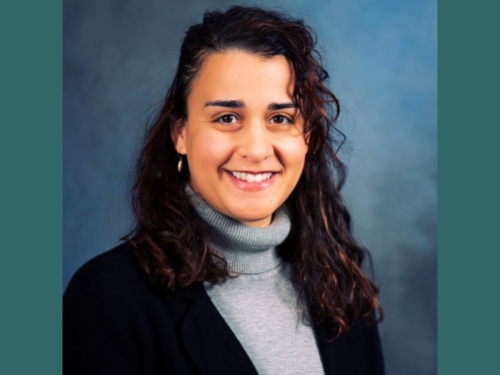DrPH Student is an Emerging Leader of Color

Mariah Seater, a student in the Doctor of Public Health program, has been selected by the National Academy for State Health Policy (NASHP) for an Emerging Leaders of Color (ELC) Fellowship. Seater is of one of only six fellows selected.
NASHP’s ELC fellowship provides an accessible pathway for early career people of color to enter state government positions or advance from current state government positions and related non-governmental organizations to lead in the development and administration of state health policy informed by their lived experience.
With a commitment to advancing the welfare of Alaska’s communities, Seater serves as a special assistant to the commissioner of the Alaska Department of Family and Community Services, based in Anchorage. In this role, Seater serves as a liaison to collaboratively engage with Tribal leaders on system-level issues, as well as on the department policy team supporting the facilities critical to supporting the state’s most vulnerable individuals. A proud lifelong Alaskan, Seater brings a deep understanding of the unique challenges and opportunities facing the state’s diverse populations and communities.
Prior to her current position, she served as a health equity advisor for the CDC Foundation, where she actively contributed to shaping policies and initiatives aimed at reducing health disparities in Alaska. Her commitment to advancing health equity also led her to work as a contractor for Partners for Advancing Health Equity, a Robert Wood Johnson Foundation collaborative based at the Tulane University School of Public Health and Tropical Medicine.
Fellows are paired with senior-level state official advisors from communities of color for an immersive experience developing a health policy project that aligns with their advisor’s state strategy. Advisors create collaborative learning environments with hands-on state health policy experience throughout the fellowship period.
Seater will be paired with Dr. Michelle Robinson, inaugural director of the Office of Health Equity at the Wisconsin Department of Health Services. Fellows meet with their advisors early in the program to plan project activities. Mid-way through the program, the fellowship convenes in Washington D.C. to engage with policy officials and continue leadership training. They will complete their projects by the end of the calendar year.
“We hope this group of fellows will be inspired by senior state leaders and one another — to realize their vision of leading state health policy informed by their own experiences. Having different perspectives in state leadership is critical in advancing how we build and execute state policy to better meet the needs of our communities,” said Hemi Tewarson, president and executive director of NASHP.
Seater plans to make great use of her fellowship. “I am looking forward to gaining a deeper insight into the interaction between public health research and policymaking at the state level, particularly examining the dynamics between research institutions and government agencies,” she said. “Observing their communication (or lack thereof) to shape equitable health policies and identifying areas for enhancement will be my focus in the coming months.”
Seater holds a bachelor of science degree in kinesiology, a master of science degree in educational psychology from the University of Nevada, Las Vegas, and a master of public health degree in public health practice from the University of Alaska Anchorage.
